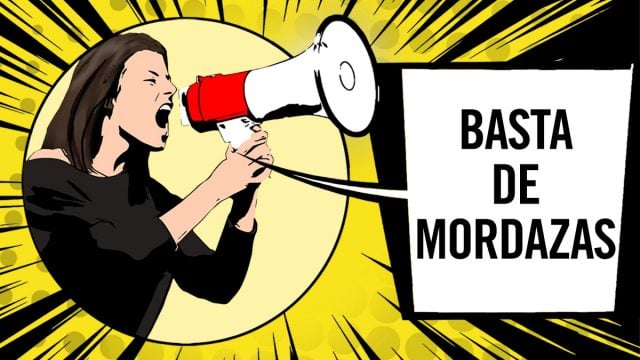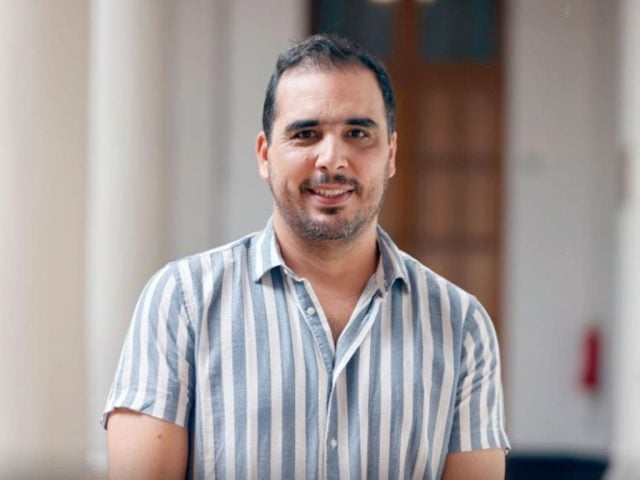The Spanish Congress of Deputies is debating to carry out the reform of the Citizen Security Law, known as the ‘Gag Law’ (Ley Mordaza), which was approved only by the conservative Popular Party (PP) in 2015, when it held the absolute majority of the congress.
Since its approval, it has been an enormously criticized norm on the grounds that it limits fundamental rights, criminalizes protest and that it had been decreed to limit, precisely, the new forms of discontent that began to emerge after the outbreak of the 2008 economic crisis. and the emergence of the 15M movement.
Its repeal was one of the electoral promises of Pedro Sánchez before reaching the Presidency of the Government and one of the demands of his partner in the Government, Unidos Podemos (United We Can – UP), details the journalist Nuria López in an RT report.
Now, the main detractors of the reform are the most conservative police unions, a position that has been taken up by the extreme right of the Vox political party and by the other two right-wing national formations, Partido Popular(Popular Party – PP) and Ciudadanos (Citizens), in their partisan struggle.
What are the main changes included in the reform?
This law has resulted in the issuance of more than 1.3 million economic sanctions since 2015. Fines that can be really high. For example, sanctioning between 30,000 and 600,000 euros, for holding a non-communicated protest if it involves risk for people, refusing to dissolve the protest or disturbing public order.
The punishment of other actions has also been involved in the controversy, such as the lack of respect for members of the security forces in the exercise of their functions, which carries a fine of between 100 and 600 euros imposed only according to the criteria of the complaining agent himself.
It is criticized that this law gives presumption of veracity to the testimony of the agents of the authority, unless there is evidence to the contrary, so it goes against the presumption of innocence of the citizens. In addition, the evidence to contradict the officials’ account is difficult to obtain, since the same regulations prohibit recording the agents in the exercise of their functions.
The changes that are being debated in the Hemicycle this week, and that are expected to be approved, include the decriminalization of spontaneous demonstrations in certain cases and that the sanctions take into account the individual economic capacity of each person.
In addition, the detention time of those who refuse to identify themselves will be reduced from the current maximum of 6 hours to 2 hours -except in exceptional cases-, and a nuance is included regarding the presumption of veracity of the police reports, which to be considered thus, they must be consistent, logical and reasonable.
Other changes
Other changes that will be discussed over the next few days are as follows:
Photo or video record the agents:
In current regulations, it is a serious offense «the unauthorized use of images or personal or professional data of authorities or members of the Security Forces that could endanger the personal or family safety of the agents, of the protected facilities or the success of an operation is at risk ”, which has led many agents to directly prevent the taking of images.
From now on, if the reform goes ahead, «the mere taking of images in places of public transit and demonstrations, or their mere dissemination, will not constitute an offense», although it will, as up to now, if agents are endangered or their families.
Body search:
The amendments presented by the Socialist Party (PSOE) and UP also include a modification of article 20, which will go on to indicate that external body searches must be «rationally and objectively founded», not as now, that it is only necessary that there be «rational signs’ that one can find instruments or ‘relevant’ personal effects. In addition, the principles of «equal treatment and non-discrimination» will be added.
Riot gear:
In order to restore citizen security in protest demonstrations, it is necessary to intervene by giving clear verbal warning and using «always the least harmful means for people and avoiding those that cause irreparable injuries».
This point is understood as an allusion to the use of rubber pellets that have already caused many citizens to lose an eye due to their impact.
Opposition from police unions
Just before the start of this parliamentary debate, this Saturday there was a protest demonstration called in Madrid by the most hegemonic sector and ideologically located to the right of the Police, which was attended mainly by members of the National Police and the Civil Guard.
According to Jusapol (Police for Wage Justice -Justicia Salarial Policial), one of the associations calling for the march, the reform of the Citizen Security Law constitutes an attack by the Government on police officers and civil guards, which «leaves the agents of the Security Forces on the floor and benefits criminals and violent protesters «, according to its president, Miguel Ángel Gómez, in statements collected by Europa Press.
The criticisms, and specifically the demonstration last weekend, were joined by the most conservative forces of Parliament, Vox, the PP and Ciudadanos, whose representatives participated in the protest.
The proclamations against this reform, such as that it unprotects citizens and protects criminals, or that it leaves policemen ‘alone’, collide with the latest known crime data, which reflects that crime in Spain is at historical lows, with only 39 crimes per 1,000 inhabitants.
Thus, during the first nine months of the year there have been 11.2% fewer homicides and murders and 5.5% fewer robberies with force. One of the few crimes that have increased have been sexual assaults (30% more), which, according to the Ministry of the Interior, it is because the active policies that have been carried out, have led to a greater disposition of the victims of these crimes to denounce, thus reducing the levels of underreporting.
Compared with 2019, the year immediately prior to the outbreak of the coronavirus pandemic and the measures it entailed, such as the confinement of the entire population in Spain, crime has dropped by 13.6%.
With these data on the table, it is expected that the majority of the Spanish Congress of Deputies will support the reform, with the exception of the three political forces that have supported this Saturday’s protest demonstration.











